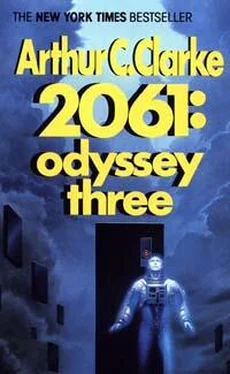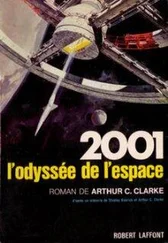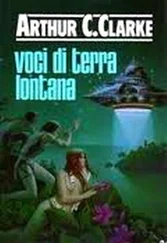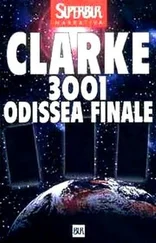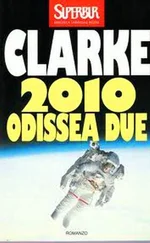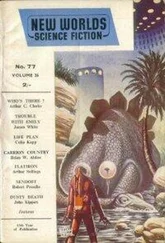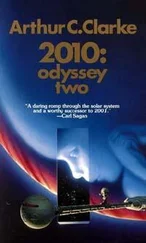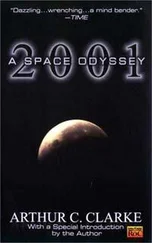Arthur Clarke - 2061 - Odyssey Three
Здесь есть возможность читать онлайн «Arthur Clarke - 2061 - Odyssey Three» весь текст электронной книги совершенно бесплатно (целиком полную версию без сокращений). В некоторых случаях можно слушать аудио, скачать через торрент в формате fb2 и присутствует краткое содержание. Жанр: Фантастика и фэнтези, на английском языке. Описание произведения, (предисловие) а так же отзывы посетителей доступны на портале библиотеки ЛибКат.
- Название:2061: Odyssey Three
- Автор:
- Жанр:
- Год:неизвестен
- ISBN:нет данных
- Рейтинг книги:3 / 5. Голосов: 1
-
Избранное:Добавить в избранное
- Отзывы:
-
Ваша оценка:
- 60
- 1
- 2
- 3
- 4
- 5
2061: Odyssey Three: краткое содержание, описание и аннотация
Предлагаем к чтению аннотацию, описание, краткое содержание или предисловие (зависит от того, что написал сам автор книги «2061: Odyssey Three»). Если вы не нашли необходимую информацию о книге — напишите в комментариях, мы постараемся отыскать её.
2061: Odyssey Three — читать онлайн бесплатно полную книгу (весь текст) целиком
Ниже представлен текст книги, разбитый по страницам. Система сохранения места последней прочитанной страницы, позволяет с удобством читать онлайн бесплатно книгу «2061: Odyssey Three», без необходимости каждый раз заново искать на чём Вы остановились. Поставьте закладку, и сможете в любой момент перейти на страницу, на которой закончили чтение.
Интервал:
Закладка:
Willis abruptly vanished, to be replaced by a less agitated subject – Mount Zeus. But that was much more active than any well-behaved mountain should be; Dr Kreuger was astonished to see how much it had changed since the last transmission from Europa.
'Real time,' he ordered. 'Sound.'
'...almost a hundred metres a day, and the tilt has increased fifteen degrees. Tectonic activity now violent – extensive lava flows around the base – I have Dr van der Berg with me – Van, what do you think?'
My nephew looks in remarkably good shape, thought Dr Kreuger, considering what he's been through. Good stock, of course.
'The crust obviously never recovered from the original impact, and it's giving way under the accumulated stresses. Mount Zeus has been slowly sinking ever since we discovered it, but the rate has speeded up enormously in the last few weeks. You can see the movement from day to day.'
'How long before it disappears completely?'
'I can't really believe that will happen...'
There was a quick cut to another view of the mountain, with Victor Willis speaking off camera.
'That was what Dr van der Berg said two days ago. Any comment now, Van?'
'Er – it looks as if I was mistaken. It's going down – quite incredible – only half a kilometre left! I refuse to make any more predictions...'
'Very wise of you, Van – well, that was only yesterday. Now we'll give you a continuous time-lapse sequence, up to the moment we lost the camera...'
Dr Paul Kreuger leaned forward in his seat, watching the final act of the long drama in which he had played such a remote, yet vital role.
There was no need to speed up the replay: he was already seeing it at almost a hundred times normal. An hour was compressed into a minute – a man's lifetime into that of a butterfly.
Before his eyes, Mount Zeus was sinking. Spurts of molten sulphur rocketed skywards around it at dazzling speed, forming parabolas of brilliant, electric blue. It was like a ship going down in a stormy sea, surrounded by St Elmo's fire. Not even Io's spectacular volcanoes could match this display of violence.
'The greatest treasure ever discovered – vanishing from sight,' said Willis in hushed and reverential tones: 'Unfortunately, we can't show the finale. You'll soon see why.'
The action slowed down into real time. Only a few hundred metres of the mountain were left, and the eruptions around it now moved at a more leisurely speed.
Suddenly, the whole picture tilted; the camera's image stabilizers, which had been holding their own valiantly against the continuous trembling of the ground, gave up the unequal battle. For a moment it seemed as if the mountain was rising again – but it was the camera tripod toppling over. The very last scene from Europa was a close-up of a glowing wave of molten sulphur, about to engulf the equipment.
'Gone for ever!' lamented Willis. 'Riches infinitely greater than all the wealth that Golconda or Kimberley ever produced! What a tragic, heartbreaking loss!'
'What a stupid idiot!' spluttered Dr Kreuger. 'Doesn't he realize...'
It was time for another letter to Nature. And this secret would be much too big to hide.
56 – Perturbation Theory
From: Professor Paul Kreuger, FRS, etc.
To: The Editor, NATURE Data Bank (Public access)
Subject: MOUNT ZEUS AND JOVIAN DIAMONDS
As is now well understood, the Europan formation known as 'Mount Zeus' was originally part of Jupiter. The suggestion that the cores of the gas giants might consist of diamond was first made by Marvin Ross of the University of California's Lawrence Livermore National Laboratory in a classic paper 'The ice layer in Uranus and Neptune – diamonds in the sky?' (Nature, Vol 292, No. 5822, pp. 435-6, 30 July 1981). Surprisingly, Ross did not extend his calculations to Jupiter.
The sinking of Mount Zeus has produced a veritable chorus of lamentations, all of which are totally ridiculous – for the reasons given below.
Without going into details, which will be presented in a later communication, I estimate that the diamond core of Jupiter must have had an original mass of at least 10^28 grams. This is ten billion times that of Mount Zeus.
Although much of this material would doubtless have been destroyed in the detonation of the planet and the formation of the – apparently artificial – sun Lucifer, it is inconceivable that Mount Zeus was the only fragment to survive. Although much would have fallen back on to Lucifer, a substantial percentage must have gone into orbit – and must still be there. Elementary perturbation theory shows that it will return periodically to its point of origin. It is not, of course, possible to make an exact calculation, but I estimate that at least a million times the mass of Mount Zeus is still orbiting in the vicinity of Lucifer. The loss of one small fragment, in any case most inconveniently located on Europa, is therefore of virtually no importance. I propose the establishment, as soon as possible, of a dedicated space-radar system to search for this material.
Although extremely thin diamond film has been mass-produced since as long ago as 1982, it has never been possible to make diamond in bulk. Its availability in megaton quantities could totally transform many industries and create wholly new ones. In particular, as was pointed out by Isaacs et al almost a hundred years ago (see Science, 151, pp. 682-3, 1966) diamond is the only construction material which would make possible the so-called 'Space elevator', allowing transportation away from Earth at negligible cost. The diamond mountains now orbiting among the satellites of Jupiter may open up the entire Solar System; how trivial, by comparison, appear all the ancient uses of the quartic-crystallized form of carbon!
For completeness, I would like to mention another possible location for enormous quantities of diamond – a place, unfortunately, even more inaccessible than the core of a giant planet...
It has been suggested that the crusts of neutron stars may be largely composed of diamond. As the nearest known neutron star is fifteen light years away, and has a surface gravity seventy thousand million times that of Earth, this can hardly be regarded as a plausible source of supply.
But then – who could ever have imagined that one day we would be able to touch the core of Jupiter?
57 – Interlude on Ganymede
'These poor, primitive colonists!' lamented Mihailovich. 'I'm horrified – there's not a single concert grand on the whole of Ganymede! Of course, the thimbleful of optronics in my synthesizer can reproduce any musical instrument. But a Steinway is still a Steinway – just as a Strad is still a Strad.'
His complaints, though not altogether serious, had already aroused some counter-reactions among the local intelligentsia. The popular Morning Mede programme had even commented maliciously: 'By honouring us with their presence, our distinguished guests have – if only temporarily – raised the cultural level of both worlds...'
The attack was aimed chiefly at Willis, Mihailovich and M'Bala, who had been a little too enthusiastic in bringing enlightenment to the backward natives. Maggie M had created quite a scandal with an uninhibited account of Zeus-Jupiter's torrid love affairs with Io, Europa, Ganymede and Callisto. Appearing to the nymph Europa in the guise of a white bull was bad enough, and his attempts to shield Io and Callisto from the understandable wrath of his consort Hera were frankly pathetic. But what upset many local residents was the news that the mythological Ganymede was of quite the wrong gender.
To do them justice, the intentions of the self-appointed cultural ambassadors were completely praiseworthy, though not entirely disinterested. Knowing that they would be stranded on Ganymede for months, they recognized the danger of boredom, after the novelty of the situation had worn off. And they also wished to make the best possible use of their talents, for the benefit of everyone around them. However, not everyone wished – or had time – to be benefited, out here on the high-technology frontier of the Solar System.
Читать дальшеИнтервал:
Закладка:
Похожие книги на «2061: Odyssey Three»
Представляем Вашему вниманию похожие книги на «2061: Odyssey Three» списком для выбора. Мы отобрали схожую по названию и смыслу литературу в надежде предоставить читателям больше вариантов отыскать новые, интересные, ещё непрочитанные произведения.
Обсуждение, отзывы о книге «2061: Odyssey Three» и просто собственные мнения читателей. Оставьте ваши комментарии, напишите, что Вы думаете о произведении, его смысле или главных героях. Укажите что конкретно понравилось, а что нет, и почему Вы так считаете.
